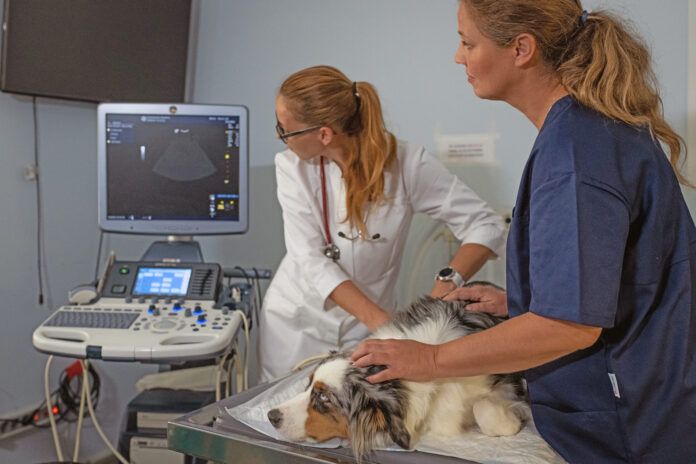If you think veterinary fees have gone up recently, you’re correct. The Bureau of Labor Statistics shows pet services have risen 60% over the last 10 years—and over 7% in just the last year. Why? Guesses range from corporate greed to higher costs for more advanced technology. (I didn’t read any statistics that any individual veterinarians are focusing more on money than care; for most, their hands are tied, and it breaks their hearts to see clients leave with a sick pet because of cost.)
So, while corporations have the right to grow, expand, and set prices they think people will pay, our alternatives to fight back are limited. The options include:
- Seek out privately owned veterinary clinics, which include around half of clinics nationwide. They may offer basic services at less than their corporate competitors. The downside is big, however: You may need to leave your favorite veterinarian and/or drive a distance.
- Buy insurance for your dog—not just accident coverage—but real health coverage for the pricey things, like surgeries and many diagnostics. My dogs have pet insurance. When one dog needed emergency surgery, what the insurer paid totaled more than every premium I had paid! The outdated “establish a savings account for your pet expenses” advice pales when you’re faced with a surgery estimate of $7,500. And, God forbid, you’re told that your dog has cancer, but he can be cured. $15,000, please.
- And here’s the biggie: Support a new bill proposed by two congresswomen that will amend IRS rules on the use of HSAs and FSAs to include pet expenses up to $1,000. They’re asking that benefits for verified service animals would be limitless.
Congresswomen Deborah Ross of North Carolina and Claudia Tenney of New York introduced the People and Animals Well-being (PAW) Act on September 10. The bill wants to “expand eligibility to include veterinary care expenses under tax-advantaged health care spending accounts, specifically Health Savings Accounts (HSAs) and Flexible Spending Accounts (FSAs). Additionally, the legislation supports veterans and people living with disabilities by imposing no limit on veterinary care expenses for service animals and by ensuring that the Internal Revenue Service (IRS) relies on an up-to-date federal definition of ‘service animal’ for HSA and FSA expenses, which includes animals trained to assist with both physical and mental disabilities,” says Ross.
“Our pets and service animals are cherished members of our families, and it’s essential that owners have the ability to pay for quality care. The PAW Act offers greater flexibility to pet owners by allowing them to use HSAs and FSAs for pet care expenses,” says Tenney.
No, this bill isn’t perfect and $1,000 isn’t a lot, but it will help. Our pets are part of our family.
With so many people struggling just to feed and care for their children, shelters are overflowing with homeless pets with heartbreaking stories. If this bill keeps just one dog in his forever home, I think it’s worth it. Tell your local representatives that this bill needs to be supported and passed.







I can just hear JD Vance now – it’s for the childless cat ladies
Ha!! You’re right! I can just see him rolling his eyes and slapping his forehead!
What recourse does a pet owner have toward a vet in a clinic who misdiagnosed your pet three times, prescribed a number of wrong medications and tests and ultimately your pet died leaving the pet owner with a substantial bill to pay?
I would take legal action if I were you. They should be held accountable. And taking action would help prevent this from happening again.
Also, contact your State Veterinary Board and report this to them. It needs to be on record. For all you know, there may be others who have experienced problems with this veterinary office, as well, and may also be on record there.
“Follow the money!” Pet insurance is paradoxically the cause of higher veterinary costs. As more people get pet insurance, the costs of pet care will continue to rise. Before the introduction of pet insurance, Vets could only charge what the average person could pay out of pocket otherwise, they would have to close their doors. With pet insurance, they can charge higher rates in agreement with the insurance companies. As Vet procedure costs rise, insurance premiums will rise and will also become an absolute necessity for the middle class pet owner to have to care for their beloved pet.
My very limited experience has been that fees/costs rise when private vets are bought out be corporate entities. The staff at my long-time vet even apologizes for the increases they’ve had to institute at the direction of “corporate.”
That’s great….for those who qualify for an HSA or FSA. Those of us who have adequate coverage under Medicare + a reasonable secondary policy don’t meet those requirements.
Another option, for more affordable veterinary care, is your closest College of Veterinary Medicine. My experience with K-State has been exceptional.
It may be insurance, but (according to my previous vet in TX) it’s the Vet Clinic consolidators, like VCA (owned by the Mars family) & other PE backed consolidators that are driving prices up. You may think you are going to a private practice, but it’s really owned by a conglomerate.
I just don’t like the idea of the Federal Government getting involved in veterinary healthcare. From observing what has happened to our own healthcare since the implementation of so-called Obama-care, I would hate to think what will happen to the costs of veterinary care, if the government were to get involved.
I think greedy “free-market” posers are going to get all they can. Government regulation can put some limits to their greed. Obamacare is the reason middle class people with pre-existing conditions can still afford insurance for their healthcare. As you age or have dependents you begin to appreciate the need for this.